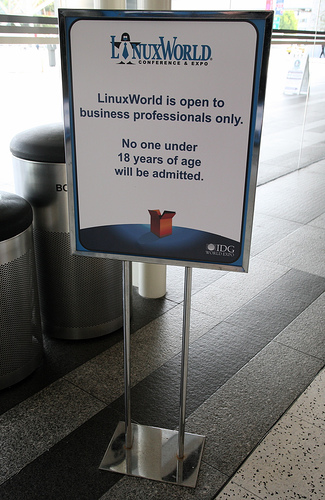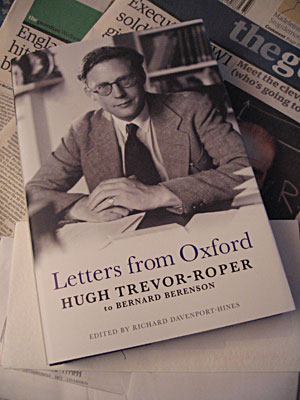
Magnetic photo rope. From here.


Magnetic photo rope. From here.
From PC World…
Boeing will phase out its Connexion by Boeing service, leaving what it once considered a promising market for in-flight Internet access.
Connexion offers broadband Internet access via Wi-Fi, using a satellite connection to the Internet, that costs about $10 to $30 per flight on commercial airlines. It also offers high-speed Internet access on executive jets and ships.
Connexion is offered on some commercial flights in Europe and Asia but was never adopted by a major U.S. carrier. First conceived in 2000, the service was approved by the Federal Aviation Administration in May 2002 as the nation’s airlines were reeling from a travel slump that followed the September 11, 2001, terrorist attacks.
Besides, it’s not that good when your laptop is in the hold!

This obnoxious sign (photographed by Scott Beale, to whom many thanks) greeted visitors to LinuxWorld. The cretin responsible for it should be taken out and shot. It’s an example of what happens to a movement when idiots with MBAs get their hooks into it. Apart from anything else, Linux is the creation of people who did it for the love (or the sheer hell) of it. Since when did ‘professional’ become a term of approbation?
If, like me, you are repelled by the spectacle of millionaire rock stars miming statemanship, then you will be cheered by John Harris’s acute piece in today’s Guardian…
In response to the fact that the Irish government has recently changed its notoriously cuddly fiscal regime, so that creative types can only earn a trifling £170,000 before paying tax, Bono and his friends have moved part of their empire to the Netherlands. This may seem like a rather cruel interpretation of the news, but I don’t think I can help it: though Bono is very keen on feeding, watering and healing the world, he and his group – collectively worth £460m, it says here – don’t seem to be too keen on paying for Irish schools and hospitals. That’s good, isn’t it?
Thanks to Pete for pointing it out.
From Good Morning Silicon Valley…
A federal judge in Detroit on Thursday struck down the National Security Agency’s warrantless domestic surveillance program, calling it unconstitutional and an illegal abuse of presidential power. In a 43-page opinion, Judge Anna Diggs Taylor made quick work of the Bush administration’s “it’s classified” defense, pointing out that the program is not beyond judicial scrutiny. “The Presidential Oath of Office is set forth in the Constitution and requires him to swear or affirm that he ‘will, to the best of my ability, preserve, protect and defend the Constitution of the United States,’ ” Taylor wrote. “The Government appears to argue here that, pursuant to the penumbra of Constitutional language in Article II, and particularly because the President is designated Commander in Chief of the Army and Navy, he has been granted the inherent power to violate not only the laws of the Congress but the First and Fourth Amendments of the Constitution, itself. We must first note that the Office of the Chief Executive has itself been created, with its powers, by the Constitution. There are no hereditary Kings in America and no powers not created by the Constitution. So all ‘inherent powers’ must derive from that Constitution.”
Yes, Ma’am. The Feds are appealing, of course. But an interesting question now looms, namely the legal liability of the phone and internet companies that have been doing the government’s dirty work for it if a higher court rules that it was illegal all along.
Nothing escapes Dan Hill.
Funny how times change. I remember when Dell was regarded as unstoppable. But NYT reports today…
Three days after its announcement of a vast safety recall, Dell reported little but bad news yesterday: profits down by half, and an informal Securities and Exchange Commission investigation into its accounting.
Speaking from China to Wall Street analysts in a conference call after the earnings announcement, Michael S. Dell, the company’s founder and chairman, said, “We are not satisfied with our performance, and we will do better.”
While the company has told analysts for more than a year that it will do better, it has not been able to follow through. In a changing market, Dell has been unable to gain traction against competitors as it has in the past, when it has cut prices to gain market share.
The chief executive, Kevin B. Rollins, said yesterday that the company had cut prices “too aggressively” in a number of markets to win market share, which hurt its profitability. “We didn’t do a good job of it,” he said.
Analysts remained frustrated. Harry Blount of Lehman Brothers asked Mr. Rollins, “Why should we believe that your actions will be any better than they have been?”
I can’t draw to save my life, but if I could this would be a very helpful site.
Very perceptive column by John Dvorak about YouTube. He gets it exactly right, IMHO. Sample:
BERKELEY, Calif. (MarketWatch) — YouTube, the privately-held video sharing website, now delivers an estimated 100 million videos a day to its users. The site has been online for barely a year.
It’s [sic] growth rate is phenomenal and without precedent, skyrocketing into the public consciousness and becoming commonplace nearly overnight. So what do the journalists, analysts and pundits all do when they witness this moment in history? Kvetch.
Nobody actually wants to understand exactly why this happened in the first place. Instead you hear the following (and typical) Silicon Valley commentary. “How are they going to monetize it?” “It’s the dotcom bust 2.0!” “There must be a video bubble.” “They’re burning through $1.5 million a month. How can they continue?”
It’s weird but almost nobody looks at this tremendous growth curve and asks themselves, “Holy cripes! How did that happen!?!” Instead you get headlines such as “Is YouTube the next Napster?”
Apparently YouTube has stumbled on to something and perhaps we should try and understand that in itself. If and when the company manages to “monetize” (don’t you love that term?) things may change.
And you must assume that with all the marketing brains out there one of them can find a way to make money. I’m more concerned about why this product exploded the way it did. I’ll critique the money-making scheme when it appears.
So let’s look at what caused the growth. And let’s note that this company is hardly the first on the block to let users share video. Google video, in fact, looks a lot like YouTube, but never achieved this growth despite getting a big head start.
Two things seem to be at work. The first is the incredible desire people have to share video clips with each other. That’s now apparent.
What’s not so apparent, unless you actually have tried to use the various video sharing sites, is that nobody — and I mean nobody — made it easy until YouTube.
Right on! (Now there’s an ageing hippy exclamatiion if ever I saw one!) I pay — happily — for my Flickr Pro account. And, like John D, I would pay for YouTube too.
YouTube is like Flickr in the early days — you can see its members still struggling with the technology. But they’re rapidly getting on top of it. Editing movies is HARD. (Believe me, I know: I have the scars to prove it.) In a year’s time there will be even more accomplished videos like this.
Life is so unfair. First of all, the wrong people have all the money. Secondly, things always happen in the wrong sequence. I have a ton of university work to do. My colleagues are (rightly) clamouring for the delivery of various documents. And then Amazon delivers this.

Hugh Trevor-Roper has always fascinated me. I think his book The Last Days of Hitler is a masterpiece, and I have always enjoyed his malicious, right-wing journalism. T-R was about as politically-incorrect as it was possible to be. So this collection of his letters to Bernard Berenson (beautifully edited by Richard Davenport-Hines) is, for me, as pots of honey were to Winnie the Pooh. But I don’t have the time for it (so I keep telling myself) and so am rationing myself to a few letters at a time, during coffee-breaks from real work. As a result, my caffeine intake has risen alarmingly and I have developed the shakes. Bah!